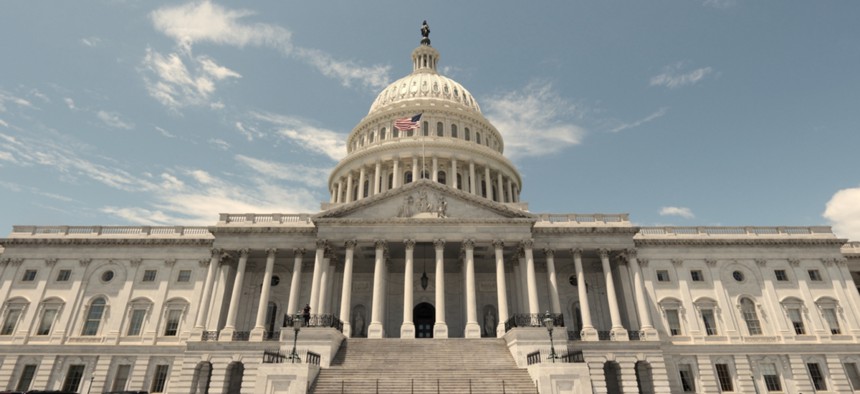Twitter, Facebook and Google Head to the Hill

Tupungato/Shutterstock.com
Congressional investigations into Russian political meddling expect answers from tech companies' lawyers.
Congress pushed fiscal 2018 budget along this week while getting ready to tackle controversial surveillance reform and grill the biggest names in social media about Russian election meddling.
The House passed the Senate version Thursday with a vote 216 to 212, which is good news for federal employees. Though both budgets require cuts, the Senate version stripped out many committee provisions that would have suggested lawmakers find budget savings by making several changes to federal retirement.
Rocky Path for Surveillance Reform
The Senate Intelligence Committee voted, 12-3, Tuesday to forward an only mildly reined-in version of a controversial National Security Agency surveillance authority to the Senate floor, but passage is far from assured.
Sen. Dianne Feinstein, D-Calif., the committee’s former ranking member, pushed but failed to pass, an amendment that would have required a warrant in all cases before spies access U.S. citizens’ data. She pledged to continue pushing that amendment on the Senate floor. Sen. Ron Wyden, D-Ore., led 11 senators introducing competing legislation that would similarly end warrantless searches on Americans.
The authority, Section 702 of the Foreign Intelligence Surveillance Act, was exposed by leaker Edward Snowden in 2013 and is due to expire at the end of this year.
Kas…pinky?... Cont’d
The first major hearing on Kaspersky anti-virus since the Russian software maker was banned from federal systems ended with a whimper rather than a bang.
Witnesses before the House Science Committee Wednesday were from the Commerce Department and General Services Administration, which have no authority over the Homeland Security Department directive banning Kaspersky. Lawmakers were often confused about the nature of the scandal and frequently mispronounced Kaspersky’s name.
Nevertheless, Science Committee leaders have promised more Kaspersky hearings to come.
Also this week, Sen. Jeanne Shaheen, D-N.H., asked Homeland Security to declassify its Kaspersky findings to help U.S. citizens better judge whether they should run the anti-virus on their own computers and Sen. Claire McCaskill, D-Mo., asked the department why it took so long to issue the ban.
The Markey-Lieu Seal of Cyber Approval
Companies would be able to verify and tout cybersecurity protections for their Internet of Things devices, under legislation introduced by Sen. Edward Markey, D-Mass., in the Senate and Rep. Ted Lieu, D-Calif., in the House Friday.
The Cyber Shield Act would create an independent advisory committee that would set cybersecurity standards for connected devices such as cameras, baby monitors and smart refrigerators. Companies that meet those standards would be able to add a seal of approval to their products similar to a certification for organic foods.
Nominee Watch
The Senate will consider nominations of the Emily Webster Murphy to be the General Services Administration leader Monday evening and James Bridenstine to be NASA Administrator Wednesday.
Hearings Most Likely to Go Viral
Twitter, Facebook and Google general counsel head to the Hill Wednesday for two hearing on how Russia used the platforms to influence the U.S. presidential election. They start in front of the Senate Select Committee on Intelligence at 9:30 a.m. and then go before the House Russia Investigative Task Force at 2 p.m.
Earlier this week, Twitter announced it would label political ads and banned Russian media outlets RT and Sputnik from paying for ads. The House Oversight IT subcommittee questioned whether political ad disclosures—which the recently introduced Honest Ads Act would do—would be overly burdensome to small companies that sell internet ads.
The House Intelligence committee will interview Carter Page, the former foreign policy adviser to the Trump campaign, Thursday at 9 a.m.
The Rest of the Week
The House Homeland Security Committee on Monday holds a West Coast hearing featuring Homeland Security and Coast Guard officials discussing how secure ports are from physical and cyber threats.
Census and Government Accountability Office officials on Tuesday afternoon will address the Senate Homeland Security committee’s concerns about cost overruns and information security concerns about the 2020 Census. When Commerce Secretary Wilbur Ross was before the House, he asked for an additional $4.5 billion for the count.
Tuesday afternoon, the Senate Health, Education, Labor and Pensions Committee listens to Health and Human Services Department officials discuss technology and the implementation of the 21st Century Cure Act, which has provisions that advance cancer research and precision medicine.
A House Judiciary panel on Wednesday will hear from Federal Trade Commission and Federal Communications Commission officials about net neutrality and antitrust regulations at 10 a.m.
Federal Emergency Management Agency Administrator Brock Long makes his first appearance before the House Homeland Security committee Wednesday at 10 a.m. to discuss agency priorities and recent hurricane response.
House Energy and Commerce subcommittees examine how to secure consumers’ credit card data at 10 a.m. and listen to states’ experience with FirstNet, the nationwide public safety network, starting at 10:15 a.m.





